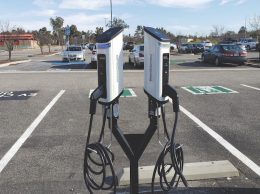EVMatch of Santa Barbara wins prestigious $25,000 climate prize
IN THIS ARTICLE
- Energy Topic
- Staff Report Author
By Staff Report Monday, July 27th, 2020
Santa Barbara electric vehicle infrastructure platform EVmatch took home a prestigious award on July 27 for its climate efforts, including a $25,000 prize.
The startup, which connects EV drivers with residential and commercial charging stations, was among 10 winners of the 2020 Keeling Curve Prize.
“These projects—like our former winners—were vetted by top climate experts as having significant potential to help curb global warming,” Jacquelyn Francis, director of the Global Warming Mitigation Project, said in a news release. The Aspen, Colo. nonprofit administers the awards.
“I hope my peers in the philanthropic community join the Keeling Curve Prize in supporting these projects so that they can scale up further and help us get the climate crisis under control,” Francis said.
EVmatch’s platform brings the Airbnb model to electric vehicle charging stations, allowing EV owners to monetize their charging infrastructure when it’s not in use and drivers to find convenient charging options. The company launched out of the UC Santa Barbara Bren School of Environmental Management in 2016 and now has nine employees on the West Coast and in Denver.
“This prize money will specifically support expansion of our peer-to-peer electric vehicle charging network to underserved communities in Chicago that have virtually no access to public EV charging stations,” founder Heather Hochrein told the Business Times in an email. “Our demonstration project will be leveraged as a case study, showing how peer-to-peer charging can cost effectively address the critical shortage of EV charging infrastructure in dense, urban communities.”
Other winners included carbon capture projects from Indonesia and Iceland, “last mile” transportation efforts, financing mechanisms for renewables and impact investments, and other projects aimed at reducing carbon emissions and supporting communities impacted by climate change.
The awardees were chosen from a pool of more than 300 candidates from 68 countries, the organization said. The Keeling Curve Prize is named for the metric that tracks global carbon dioxide levels developed by Charles Keeling. Carbon dioxide levels have been trending up for decades and averaged 416 parts per million in June.
“The purpose of the Keeling Curve Prize is to bend the Keeling Curve back to a safe level of atmospheric carbon dioxide, which scientists say is a maximum of 350 parts per million. I am confident our Keeling Curve Prize winners can help us get there,” Francis said.











